

The Cost of Paying Attention. Photo A FEW years ago, in a supermarket, I swiped my bank card to pay for groceries.
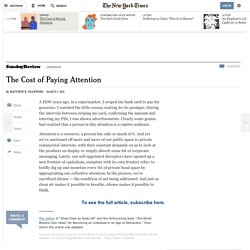
I watched the little screen, waiting for its prompts. During the intervals between swiping my card, confirming the amount and entering my PIN, I was shown advertisements. Clearly some genius had realized that a person in this situation is a captive audience. Attention is a resource; a person has only so much of it. What if we saw attention in the same way that we saw air or water, as a valuable resource that we hold in common? The sad state of this commons is on display everywhere; consider the experience of being in an airport. I am already in a state of low-level panic about departure times, possible gate changes and any number of other contingencies. Somehow L’Oréal has the Transportation Security Administration on its side. An airport lounge once felt rich with possibilities for spontaneous encounters.
The benefits of silence are off the books. Attention, distraction and the war in our brain [ TEDx : Jean-Philippe Lachaux ] 5 Ways a New Approach Can Improve Your Life Today. Simone Weil on Attention and Grace. “Attention without feeling,” Mary Oliver wrote in her beautiful elegy for her soul mate, “is only a report.”
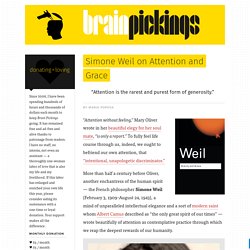
To fully feel life course through us, indeed, we ought to befriend our own attention, that “intentional, unapologetic discriminator.” More than half a century before Oliver, another enchantress of the human spirit — the French philosopher Simone Weil (February 3, 1909–August 24, 1943), a mind of unparalleled intellectual elegance and a sort of modern saint whom Albert Camus described as “the only great spirit of our times” — wrote beautifully of attention as contemplative practice through which we reap the deepest rewards of our humanity. In First and Last Notebooks (public library) — the out-of-print treasure that gave us Weil on the key to discipline and how to make use of our suffering — she writes: Attention is the rarest and purest form of generosity.
Weil considers the superiority of attention over the will as the ultimate tool of self-transformation: William James on Attention, Multitasking, and the Habit of Mind That Sets Geniuses Apart. “Attention is the rarest and purest form of generosity,” Simone Weil wrote.
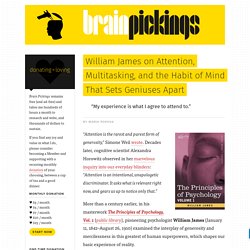
Decades later, cognitive scientist Alexandra Horowitz observed in her marvelous inquiry into our everyday blinders: “Attention is an intentional, unapologetic discriminator. It asks what is relevant right now, and gears us up to notice only that.” More than a century earlier, in his masterwork The Principles of Psychology, Vol. 1 (public library), pioneering psychologist William James (January 11, 1842–August 26, 1910) examined the interplay of generosity and mercilessness in this greatest of human superpowers, which shapes our basic experience of reality. Self-Consciousness. Intuition.
Conflict Management. Surprise. Taking Action. Ethos. The Secret Power of ‘Read It Later’ Apps. You can see that I save more things toward the beginning of the week and the weekend, and then draw down the buffer more towards the end of the week.
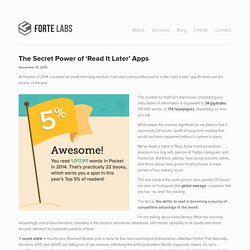
/sidebar Imagine for a second if we could do this with everything. On Saturday morning, well-rested and wise, you retroactively decide everything you want to have done during the previous week. Anything you decide was not worthwhile, you get that time back. I experienced this recently with email — after returning from a 10-day meditation course during which I was completely off the grid, I was surprised to notice it took only 1.9 hours to process almost 2 weeks’ worth of email (I track these things). If only this method would scale. /end_sidebar There are drawbacks, which I’ve glossed over until now. 1. Many sites, including popular ones, aren’t presented correctly within the Pocket app (and I imagine others). The worst part is that, sometimes, the article is cut off or links don’t appear without any indication that something is amiss. 2. 4 Funky Mind Hacks That Reduce Errors, Boost Attention and Memory. Philosophy of Time. Broken Windows Theory: Why Winners Keep Their Homes Clean.
This article was originally published at Riskology.co This morning, I woke up and did exactly what I do almost every morning: Went for a runMade my bedFed the dogsCleaned the kitchen Once that was done, it was work time.
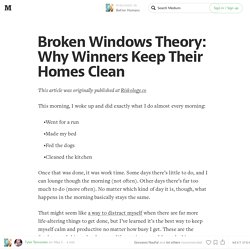
Some days there’s little to do, and I can lounge though the morning (not often). Other days there’s far too much to do (more often). That might seem like a way to distract myself when there are far more life-altering things to get done, but I’ve learned it’s the best way to keep myself calm and productive no matter how busy I get. When things get out of control, I remember my mother’s wisdom to her ornery son: “Big boys make their beds.” If you’re the type of person who feels habitually over-worked, stressed out, and overwhelmed (and probably not producing quality work) there’s an important lesson here. Broken Windows Theory: How Your Day Gets Out Of Control In The Tipping Point, Malcolm Gladwell writes about George L. You can follow that lead in your own life.